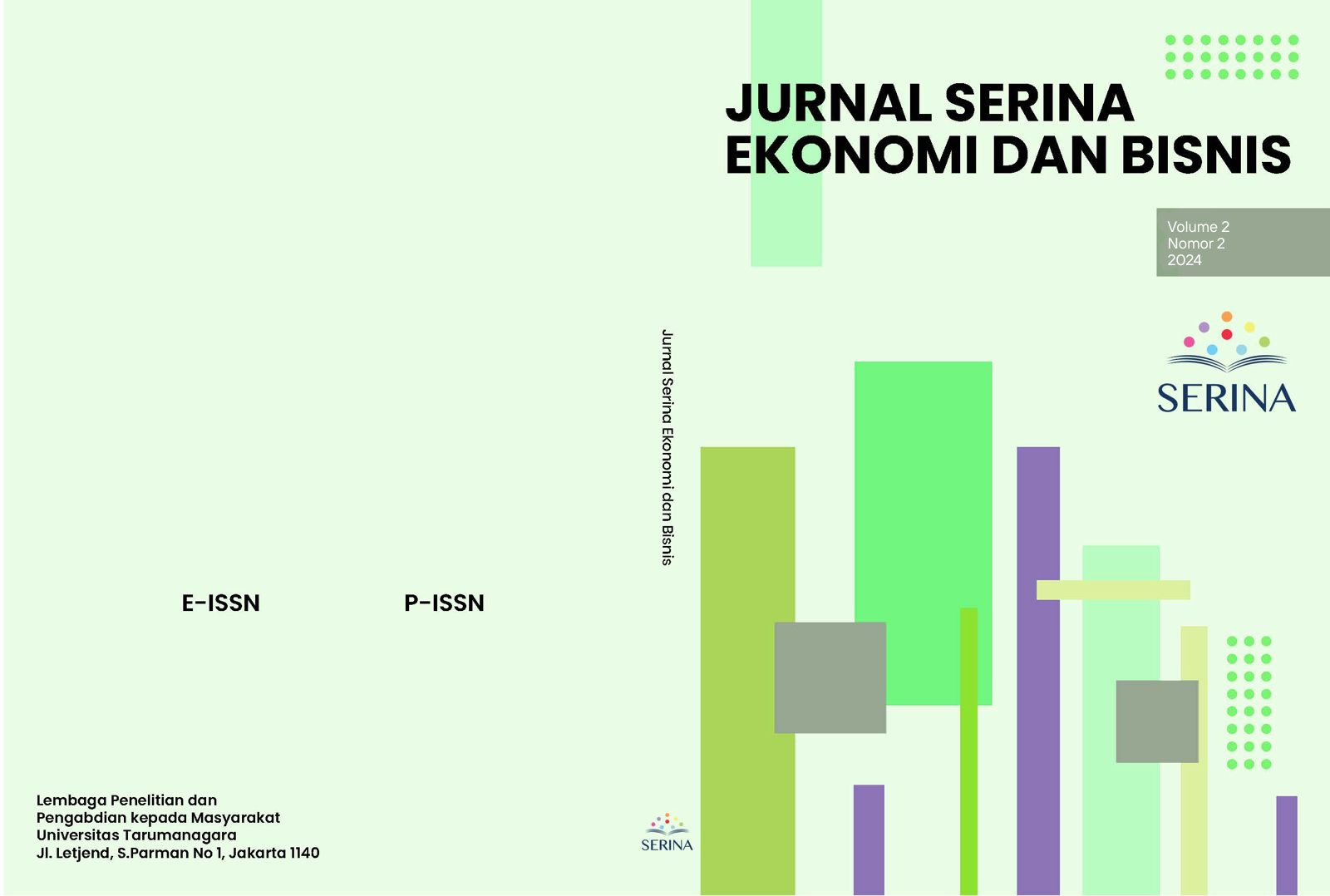FAKTOR- FAKTOR YANG MEMPENGARUHI MINAT BERWIRAUSAHA GEN Z DI WILAYAH JAKARTA UTARA
Main Article Content
Abstract
Masalah pengangguran merupakan salah satu isu utama yang dihadapi oleh masyarakat di wilayah Jakarta Utara, khususnya pada kalangan remaja Generasi Z. Salah satu solusi strategis untuk mengatasi masalah ini adalah dengan mendorong generasi muda untuk berwirausaha. Tentunya, minat berwirausaha dipengaruhi oleh berbagai faktor, baik internal seperti motivasi dan efikasi diri, maupun eksternal seperti lingkungan keluarga. Penelitian ini bertujuan untuk menguji pengaruh motivasi, efikasi diri, dan lingkungan keluarga terhadap minat berwirausaha pada remaja Generasi Z di Jakarta Utara. Penelitian ini menggunakan pendekatan deskriptif kuantitatif dengan metode survei. Data dikumpulkan melalui kuesioner online dari 80 responden yang dipilih secara purposive sampling. Teknik analisis data dilakukan menggunakan perangkat lunak SmartPLS dengan metode Partial Least Squares Structural Equation Modeling (PLS-SEM). Hasil penelitian menunjukkan bahwa motivasi, efikasi diri, dan lingkungan keluarga memiliki pengaruh positif dan signifikan terhadap minat berwirausaha. Efikasi diri ditemukan sebagai faktor dominan dalam mendorong minat berwirausaha, diikuti oleh motivasi dan lingkungan keluarga. Penelitian ini menyoroti pentingnya peran keluarga dalam memberikan dukungan moral dan material, serta pentingnya meningkatkan kepercayaan diri dan motivasi generasi muda dalam menjalankan usaha.
Unemployment remains a significant issue in Jakarta Utara, particularly among Generation Z youth. One strategic solution to address this issue is by encouraging young people to engage in entrepreneurship. Entrepreneurial interest is influenced by various factors, including internal ones such as motivation and self-efficacy, and external ones such as the family environment. This study aims to examine the influence of motivation, self-efficacy, and family environment on entrepreneurial interest among Generation Z youth in Jakarta Utara. This study employs a descriptive quantitative approach using survey methods. Data were collected through online questionnaires distributed to 80 respondents selected via purposive sampling. Data analysis was conducted using SmartPLS software and the Partial Least Squares Structural Equation Modeling (PLS-SEM) method.The findings reveal that motivation, self-efficacy, and family environment positively and significantly affect entrepreneurial interest. Among these factors, self-efficacy was identified as the most dominant in fostering entrepreneurial interest, followed by motivation and family environment. The study highlights the critical role of families in providing moral and material support, as well as the importance of enhancing young people's confidence and motivation in pursuing entrepreneurial endeavors.
Article Details

This work is licensed under a Creative Commons Attribution-NonCommercial-ShareAlike 4.0 International License.
References
Battistelli, A., Montani, F., & Odoardi, C. (2019). The influence of family pressure on entrepreneurial intention and persistence: A study of university students. International Journal of Entrepreneurial Behavior & Research, 25(2), 246-265. DOI: 10.1108/IJEBR-04-2018-0278.
Creswell, J. W. (2014). Research Design: Qualitative, Quantitative, and Mixed Methods Approaches. SAGE Publications.
Deci, E. L., & Ryan, R. M. (2020). Intrinsic and extrinsic motivations: Classic definitions and new directions. Contemporary Educational Psychology, 61, 324-336. https://doi.org/10.1016/j.cedpsych.2020.101871
Farashah, A. D. (2021). The impact of overconfidence and entrepreneurial self-efficacy on entrepreneurial intentions. International Journal of Entrepreneurial Behavior & Research, 27(1), 120-140. DOI: 10.1108/IJEBR-03-2020-0146.
Hair, J. F., Hult, G. T. M., Ringle, C. M., & Sarstedt, M. (2019). A Primer on Partial Least Squares Structural Equation Modeling (PLS-SEM).
Halim, D., & Rodhiah. (2024). Faktor Penentu Niat Berwirausaha pada Mahasiswa. Jurnal Manajerial dan Kewirausahaan, 6(3), 672–680. https://journal.untar.ac.id/index.php/JMDK/article/view/31600/18549
Nowiński, W., Haddoud, M. Y., Lančarič, D., Egerová, D., & Czeglédi, C. (2019). The impact of entrepreneurship education, entrepreneurial self-efficacy and gender on entrepreneurial intentions of university students in the Visegrad countries. Journal of Business Research, 96, 220-229. DOI: 10.1016/j.jbusres.2018.11.033.
Parker, S. K., Bindl, U. K., & Strauss, K. (2019). Making things happen: A model of proactive motivation. Journal of Management, 45(3), 878-906.
Rodhiah. (2020). Pengaruh faktor-faktor yang mempengaruhi minat berwirausaha terhadap keputusan memulai usaha. Jurnal Manajemen dan Kewirausahaan, 2, 653-661. https://journal.untar.ac.id/index.php/JMDK/article/view/9577/6079
Sari, D., & Indrawati, Y. (2019). Pengaruh lingkungan keluarga terhadap minat berwirausaha pada mahasiswa. Jurnal Kewirausahaan dan Bisnis, 11(2), 120-130. https://doi.org/10.1234/jkb.2019.120
Soelaiman, L., Puspitowati, I., Selamat, F. (2022). Peran Model Panutan Terhadap Intensi Berwirausaha Mahasiswa melalui Penerapan Teori Perilaku Terencana. Jurnal Muara Ilmu Ekonomi dan Bisnis, 6(2), 320-329
Teng, H. J., Lu, W. T., & Wang, L. (2023). The effect of family support on entrepreneurial intention: The role of self-efficacy and motivation. Journal of Small Business Management, 61(1), 97-115. https://doi.org/10.1080/00472778.2022.2101234
Wathanakom, N., Khlaisang, J., & Songkram, N. (2020). Entrepreneurial intention model for higher education students in Thailand. International Journal of Educational Management, 34(6), 1155-1172. DOI: 10.1108/IJEM-07-2019-0236.
Williams, C., & Vaaler, M. (2020). The Role of Entrepreneurship in Unemployment Reduction and Economic Growth: A Review of Empirical Evidence. International Journal of Entrepreneurship and Small Business.



